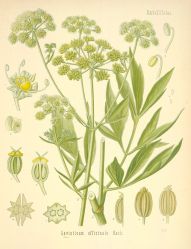Ever-lovin' Lovage
By Audrey Stallsmith

Lovage is not so much a scent as a savour, and the taste is very easy to describe. It is exactly like smoked celery. Ask anybody to bite it and he will immediately say 'celery'; then he thinks again and says: 'but there's something else.'
Beverley Nichols, Garden Open Today
Although lovage has an appropriate name for Valentine's day, I'm afraid it's one of those dependable types that tend to get overlooked in favor of more difficult "bad boys." I've had my plant so long now that I can't remember how many years ago I originally set it out.
The herb's appearance and flavor could almost make me believe that it is a cross between angelica and celery. But this comparison to more popular plants is unfair to one which can stand, quite sturdily, on its own merits. And which will still be around long after the others have bid you adieu!
A husky, handsome herb, lovage (AKA Ligusticum levisticum or Levisticum officinale) can grow as tall as a man--though it takes several years to reach that height. The plant originated in southern Europe, thus the name ligusticum which derives from Liguria (a region of Italy). It has also been known as love parsley, love ache, or bladder seed.
The herb is related to osha or Ligusticum porteri, which grows wild in the Rocky Mountains. Osha is, in fact, sometimes called wild lovage. But, as there are about 25 different ligusticums in existence, there are many forms of wild lovage! Osha actually means "bear root," since bears frequently eat the plant when emerging from hibernation or when sick.
You can candy the young stems or roots of garden lovage like angelica. Or you can substitue lovage leaves for celery leaves in soup or salads. But be sure to use only half the amount, as the flavor of the herb is stronger and more bitter than that of celery.
In Garden Open Today, Beverley Nichols suggests that slipping a few lovage leaves into a salad served to guests will make "eyes glint, and the female brain works, and says to itself: "We must know more about this, we must get the secret out of him, and will get it in private, because darling Ada opposite, though we all dote on her, is not really subtle enough for these delights." (Nichols lovage was actually Ligusticum scoticum, or Scotch lovage, a shorter-growing variety.) The dried, ground root has been employed as a substitute for celery salt as well.
A diuretic, lovage is reputed to be a remedy for urinary tract infections, as well as kidney and bladder stones--hence the nickname "bladder seed." Once used to treat scurvy, It also relieves indigestion and cramps, promotes menstruation, and induces sweating (to break fevers). In The Green Pharmacy, James Duke notes that Sichuan lovage (Ligusticum wallichii or chuanxiong) "helps prevent the formation of heart-attack triggering blood clots."
Despite its ancient history and many attributes, lovage remains a somewhat obscure herb. Even the cordial named for it also included other plants, such as tansy and yarrow.
In the Fragrant Path, Louise Beebe Wilder writes of the "tall old-fashioned 'yarb' that I found in a tiny garden that clutched a mountainside with desperate finger-like little beds; it smells of celery and was thought sovereign for coughs and a consumption. The old woman who, after a deal of hinting and finally open pleading, gave me a root in exchange for some of my best 'Pinys,' called it Levoce."
Travelers once placed lovage leaves in thier shoes to strengthen them on their journeys. Dug on the night of Good Friday, the herb will supposedly protect you from witches and other evils. And Bohemian maidens once wore it around their necks to attract more favorable attention--namely suitors!
Best of all, the herb is reputed to increase the vigor and flavor of any other plant grown near it. If love can be defined by uncomplaining steadfastness and unselfish support of others, then this plant certainly lives up to its name. And sets a good example for us all!
Levisticum officinale image is from Kohler's Medizinal-Pflanzen, courtesy of the Missouri Botanical Garden.








